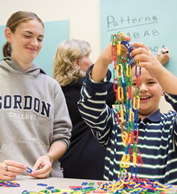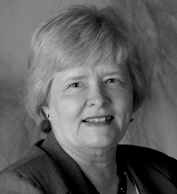STILLPOINT Archive: last updated 09/16/2009
Usually when people lose jobs they’ve enjoyed for years, they feel anxious and insecure. But Tom Esperson, a student in the graduate program at Gordon, left his on purpose: he wanted to teach. After a long business career as a chief technology officer, he told me he was no longer interested in “helping myself. I want to help others in direct and profound ways.”
Tom decided to shift gears in the middle of his life and take a job that would pay him far less than he’s ever earned. Why make such a radical change during such an uncertain time? Because whether the economy is strong or not, I’m convinced teaching remains the profession behind all others. It shapes business leaders; nurtures doctors; prepares pastors and inspires advocates. Especially in our increasingly technological and fragmented world, the personal power of a teacher remains the most important job on the planet. The character and gifts of one teacher can inspire an entire movement.
Of course, I would think that. I’m the director of the College’s graduate and licensure program in education. It’s part of my job to convince others why teaching matters now more than ever; why the classroom remains one of the most hallowed spaces on earth. But when I consider the teachers who inspired me, it’s not a hard sell.
Most of us can recall the one teacher who genuinely helped us; who challenged us to be better. His or her work was more than a job. It was a chance to make a difference in a “direct and helpful way.” Her enthusiasm and integrity went beyond meeting our needs for the day, month or year. He dedicated himself to developing us as whole people—intellectually, emotionally and socially. She wanted us to be capable of navigating our way through life’s hardest experiences.
But now, according to current data, the demand for teachers will exceed 1.5 million over the next decade. Several states are already experiencing a severe shortage. Baby boomers are retiring, leaving vacancies in most states and in all content areas, with a critical shortage in areas like languages, special education, English as a Second Language, math and the sciences. From public, private and charter schools to tutoring, classroom teaching and small-group instruction, teachers will be needed in new and demanding ways.
Today’s classrooms are often mini United Nations with students coming from a variety of ethnic and racial backgrounds. Add to that students who have disabilities sitting beside neurotypically developing students, and teachers are faced with very diverse classrooms. Teaching today requires special teachers. Gordon’s Department of Education, on both the undergraduate and graduate levels, seeks to develop them.
Recently, with a $30,000 grant from the E. Leslie Peter Foundation, education faculty Priscilla Nelson, Susan Wood and I developed a unique summer institute that brought public school teachers and Gordon education faculty together. The goals of the Teachers Institute were to:
“The Institute is about listening and collaboration as we strive to better prepare our students for the classroom,” says Nelson. “We’re hoping the Institute stimulates open discussion between teachers and college professors since we’re all committed to strengthening the future of education in America.”

